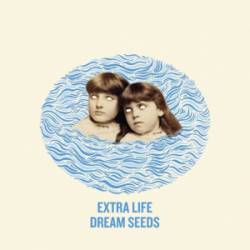Artist: Extra Life
Album: Dream Seeds
Musically, Extra Life spent their first two records inventing a style I’d wished would exist for years. On the one hand, the guitar and drums were fierce. In a measured way, heavy enough to make full-throttle speed impossible, just as Sherman tanks can’t outrace cheetahs.  But that gives time enough to think, to feint, to surprise (if someone clever and ruthless is driving the tank, you might bet against the cheetah’s escape. The part of me that gives monthly to the World Wildlife Fund apologizes for the analogy).
But that gives time enough to think, to feint, to surprise (if someone clever and ruthless is driving the tank, you might bet against the cheetah’s escape. The part of me that gives monthly to the World Wildlife Fund apologizes for the analogy).
On the other hand, Caley Monahon-Ward’s cello added subtler texture, and Charlie Looker’s singing was expressive and delicate and tuneful. He glided from note to note even in mid-syllable, technically called “melisma”, and made it sound like its church madrigal roots rather than its American Idol currency.
Often Looker’s melodies dodged around the harsh rhythms; occasionally he’d race forward and drag them with him, hearing them rattle in protest as they sped up. Second album Made Flesh had two quite pretty songs, but even one of those, Head Shrinker, was a variant more than a true exception: taunting and full of suppressed danger.
Dream Seeds is Extra Life‘s third record. Their primary style is in full flower on Righteous Seed, Discipline for Edwin, and the 14-minute Blinded Beast. But they’re branching out, softening, leaning harder on tunes and on Looker’s vocal delicacy. No Dreams Tonight centers on gently-picked guitar and slow vocal interplay, adding a flute solo, timpani, and faraway splashes of synthesizer. Little One hovers over slow note-by-note piano and cello plus periodic blasts of echo; its melody slips from fear to sweetness to evasion, to match the words. First Song builds to a lovely chorus somewhere between lullaby and anthem, and could be *too* sweet, except Looker only gets their by means of an octave-plus ascent through alarming terrain, while his band plays with off-kilter power. Ten Year Teardrop builds through influences from drone, to math-rock, to classic rock, to mediaeval composition, to insanely melodramatic moments from horror plays, to majestic film soundtrack climaxes.
The musical choices are driven by the words. As best as I can tell – there’s no printed lyrics, so I might be imposing more unity than he intends – Dream Seeds stars a narrator who, from different perspectives, reacts to the abortion of a baby he’d accidentally helped conceive. This is certainly true of Righteous Seed, a song that gives comfort to no one’s politics: “The picketer told us ‘Don’t kill your kid!’ / In another world we didn’t, but in this one we did./ The drunk words of the Jesus freak made me think about our baby./ The blunt force of a man’s belief makes me dream of what we buried”. Urgent and haunted, the narrator imagines the future taken away: “Not in love, never in love, no longer even lovers/ Still I held your hand as a friend… We raised up a righteous seed to heaven”. Every musical cue warns us our narrator is unreliable; as he ends the song singing “I’m by your side if you need to cry”, we kind of doubt she needs to. Yet his passion is easy to empathize with.
Which doesn’t mean we like the narrator; he hates himself too much. In Discipline for Edwin he imagines himself as a child abuser. In Little One he’s been kept away from the child, wanting to protect but “Unfit to play, your Mom and Dad can tell”.
First Song pictures the joyful bonding and teaching moments of raising a young child, but is still pitched in worry. Which of course is fair. It’s the fourth song that’s ever been able to make me (father of two young’uns) cry, hitting home with the plainness of “A heart-shaped rice crispy treat/ I hope you’re still sweet at 14/ … Never forget your first song/ Grown-ups know it all wrong”. But as many things as the grownup world has messed up – sorry about the climate and extinctions and water shortage we’ll be leaving you, kiddos; they seemed like good ideas at the time – I like grownups. Many of us have virtues (patience, perspective, comic timing, artistic competence) we learned only with practice. The singer of First Song feels otherwise, and time is the scariest enemy he can imagine; Blinded Beast builds up to “Face to face with the Beast of Years, running backwards”.
I think it’s powerful. I doubt Looker’s a zombie, despite his compelling account of his re-animation on Made Flesh‘s Easter, so I don’t claim to know where these songs come from either. Why I want to feel along with such emotions, I don’t know. But the tuneful, heavy, interesting music must be part of it, and it seems to keep Extra Life busy too.
– Brian Block
To see the rest of our favorites, visit our Favorite Albums of 2012 page!
